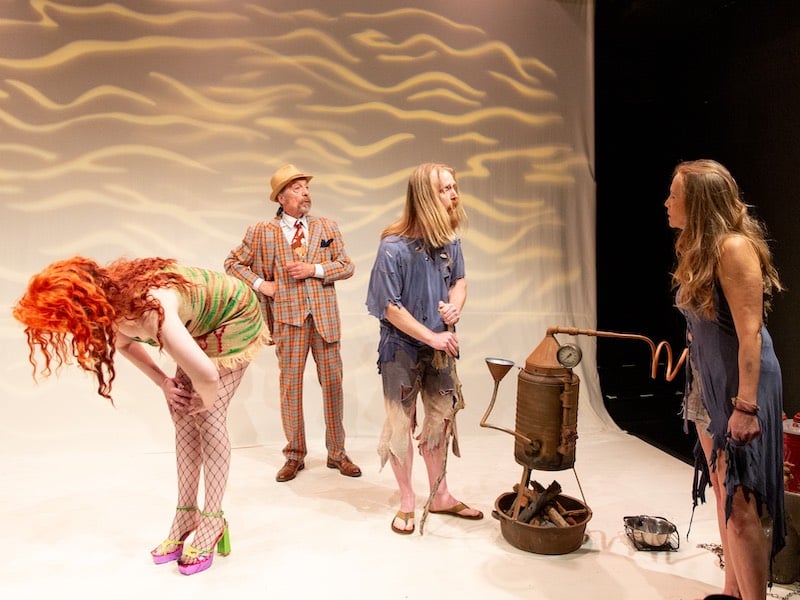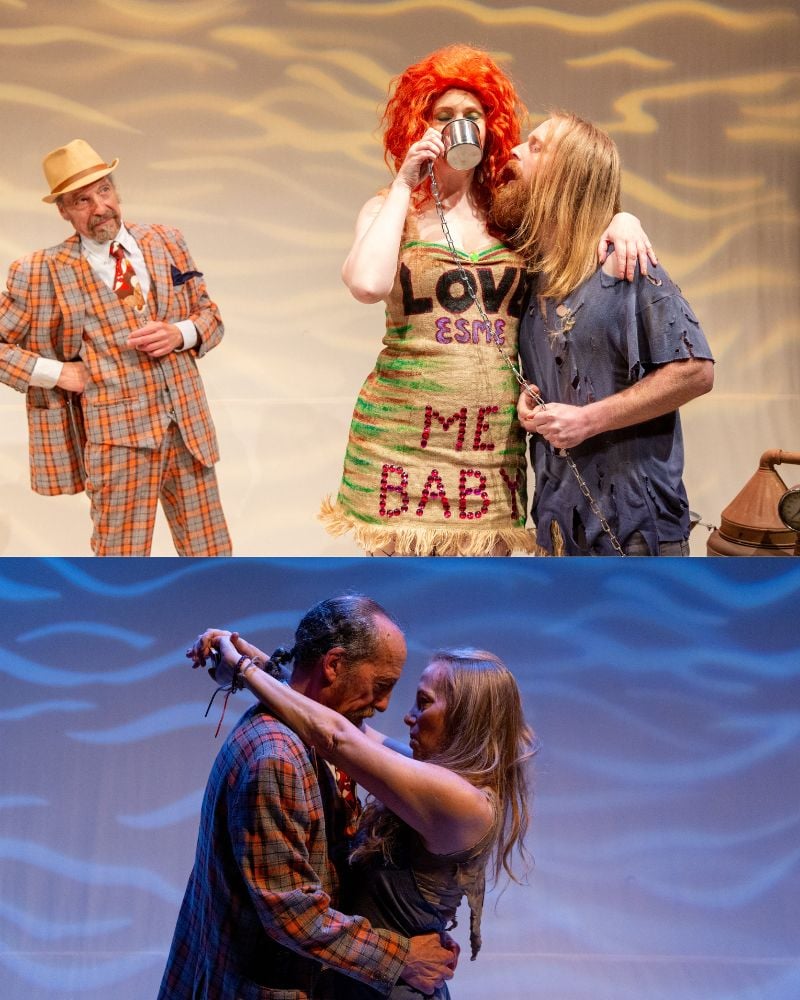The zeitgeist is having conniptions about global catastrophe, as you may have noticed. And there appear to be two polarized camps of opinion. In one are the denialists (“Not to worry, everything’s gonna be fine”). In the other are the fatalists (“Ohmygod, we’re goners!”). If you lean toward the latter — or you’re even a smidge more concerned about calamity than complacent — you’ll get a terrific kick out of the Beckettian dystopia envisioned in The Last Drop.
It’s the kind of silly futurist comedy that might be too dark for laughs.

Written by the Australian writer John Shand and now enjoying its world premiere in a wonderfully wry and rueful Scena Theatre production directed by Robert McNamara, The Last Drop tells a loopy story set on a sandy beach about Mary and Joe, two lone castaways from some unspecified Great Catastrophe. They wear shredded rags and are barely surviving by noshing on moths and distilling sea water to sip. There was a “once” when they were in love and wanted, as Mary remembers, “for there to be no other world than us enfolded in each other’s arms.” Now there really is no other world, and they bicker like bratty children, as when Mary confronts Joe about his unexplained absence:
MARY: Where d’you slink your carcass to?
JOE: For fuck’s sake, Mary, I took a crap.
MARY: Why didn’t you just say so?
JOE: It hardly seemed the basis for a chat.
MARY: Chat? What’s that? I get none of that from you. Just weighty, evil silences, studded with orders barked as at a dog, and observations ’bout the imminence of death. It’s riveting stuff, Joe, and keeps me hanging on your next and every word.
JOE: And what do you contribute to the mix? Complaints and moans and wistfulness about a past that’s best forgot.
Lest there be any doubt that gender antagonism has endured the cataclysm, Joe pithily observes:
JOE: The history of humanity comes down to men failing to understand women and meanwhile fucking up the place, while they fuck up our minds.
Playing the cantankerous couple with hostile conviction yet subtly thwarted affection are Stacy Whittle as Mary and Robert Sheire as Joe. When not squabbling, they have extraordinarily evocative monologues of dreams and reveries framed eloquently by effects of lighting (designed by Marianne Meadows) and sound (by Brandon Cook) — islands of poetic reflection amid a sea of spite. Here’s one, for instance, emblematic of the play’s point of view:
JOE: A devout Christian, a Hassidic Jew and a fundamentalist Muslim were once blown up by the same bomb. Through sheer force of faith their three souls rise up from each shattered corpse, and fly straight towards the common heaven that lies high above their divergent names for their god, their books and their prophets. But when they can rise no further, nothing. Nothing. No paradise. No clouds. No angels. No harps. No virgins. Not even a pair of locked gates and a “For Sale” sign. Nothing. Bewildered, they gingerly slip back down as low as low can go for a peek at hell. Nothing. And then the awful futility of their existences begins to dawn on them, and the effect is more savage on their souls than the bomb was on their bodies.
Remarkably Whittle and Sheire each keep their character’s scripted unpleasantness in check and wholly win us over in their plight. Said plight is not just the scarcity of potable water, for which Mary wearily schleps sea water by the handful to pour into Joe’s makeshift still; it’s also the arrival of Valentino, a peddler, and Esmeralda, whom he pimps.
Lest there be any doubt that the transactional sex economy has persisted into the apocalypse, Ron Litman as the sleazy huckster in a gaudy plaid suit is leeringly lascivious as he brokers one deal after another: candy and booze in exchange for Mary’s sexual favors and Esmeralda’s bodily proximity to the ogling Joe in exchange for a drink of distilled water, the coin of this strange realm. (Given that everyone here is experiencing “the futility of existence” and everyone is waiting not for Godot but for H2O, one might reasonably infer that the V in Valentino alludes to Vladimir; and the E in Esmeralda, to Estragon.)

Danielle Davy as Esmeralda becomes a stunning surprise. Dolled up in big red hair, a burlap sheath, and fishnet stockings (Alisa Mandel did the garish costumes) and speaking in a babydoll voice, she seems at first a statuesque ditz. But hang on, because as the weirdly wise tale unfolds, Esmeralda is revealed as the resilient one.
The author sets the time and place this way: “A dystopian future Earth (unless, of course, we can help it).” Within the snug confines of the DC Arts Center black box, this locale is deftly sketched by a white-sheet cyc that swoops onto a white floor (set design by Carl Gudenius) and serves as projection screen for ripply-wavy aquatic imagery (by Kirk Kristlibas). Such is the persuasive appeal of the performances and the script that this mock beachfront from the playwright’s imagined “future Earth” feels more than real enough for now.
The play’s big joke — and it’s a joke on us, the human race, really — is that avarice and animus have a better chance of survival than empathy and care. Or as Esmeralda puts it: “If there ever was such a thing as morality, it died with the planet.”
Scena Theatre is renowned for bringing to DC rich new dramatic literature that might not otherwise reach these shores. Six years ago, the company mounted the U.S. premiere of another play by John Shand, Guilt, a work that also wrestles with themes of sex, death, and morals and, like The Last Drop, both entertains and invigorates the mind.
Don’t miss this chance to see Shand’s work firsthand.
Running Time: One hour and 45 minutes, including an intermission.
The Last Drop plays through May 12, 2024, presented by Scena Theatre at the DC Arts Center in Adams Morgan, 2438 18th St NW, Washington, DC. Performances are 7:30 PM on Mondays through Saturdays and 2:30 PM on Sundays. Tickets are $45 and are available on Eventbrite here.
COVID Safety: Masks are optional.
The Last Drop
By John Shand
Directed by Robert McNamara
CAST
Joe: Robert Sheire
Mary: Stacy Whittle
Valentino: Ron Litman
Esmeralda: Danielle Davy
Understudy, Joe: David Johnson
DESIGN TEAM
Artistic Director: Robert McNamara
Scenic Designer: Carl Gudenius
Lighting Designer: Marianne Meadows
Costume Designer: Alisa Mandel
Sound Designer: Brandon Cook
Projections / Images: Kirk Kristlibas
Property Master: Khue Duong
Movement Coach: Kim Curtis
Fight Director: Paul Gallagher
Stage Manager: Joshua Stout
Assistant Director: Anne Nottage
Dramaturg: Cate Brewer
SEE ALSO:
Magic Time!: ‘Guilt’ at Scena Theatre (column by John Stoltenberg, January 14, 2018)




